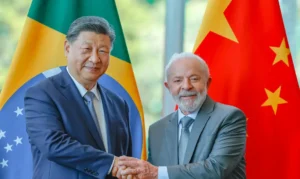
Published 02/23/2023 17:49 | Edited 2/25/2023 10:34 AM
The $120 billion in arms deliveries and financial aid for the war in Ukraine is three times more than what the UN estimates is needed to end world hunger each year. Of those, less than 5% are earmarked for humanitarian aid in Ukraine, as the rest is all earmarked for armaments and salaries to keep the Zelensky government ready for war.
With US$ 40 billion a year by 2030, the international community would eradicate food insecurity in countries such as Somalia, Burundi, Comoros, South Sudan, Syria, Yemen, Central Africa, Chad, Congo and Madagascar, the most alarming, according to the Index Global Hunger 2021. The highlight was given by the columnist of UOLJamil Chade.
But not only that. This flow of money is still 20 times greater than what is needed to feed, for one year, the poorest spread across all continents, according to the UN. This is more than twice the volume of resources required for, in 2023, to rescue 230 million people in 69 countries that are experiencing serious natural problems and armed conflicts, such as Haiti.
In the last few days alone, Japan has announced an additional $5.5 billion for Ukraine, while US President Joe Biden has put another $500 million on the table. Meanwhile, European governments are mobilizing to create a consortium to supply Ukraine with ammunition by 2023. Even poor countries in Eastern Europe contribute what they cannot to the war. Estonia, for example, sent the equivalent of 1% of its GDP to Ukrainians, against 0.07% for France and 0.4% for the US.
The repositioning of Europe and NATO allies, by sending even more advanced weapons to the Ukrainian fields, favors the possibility that Russia’s allied countries, such as China, will also start spending resources on the conflict. Apart from those that already collaborate clandestinely, like Turkey, which is accused of maintaining a parallel flow of weapons to Russia.
Biden highlighted in his speech in Warsaw on Wednesday that the Western alliance had shown its commitment to Ukrainians throughout the year, to the surprise of international analysts and even the Moscow government. In fact, with hunger spreading even to rich countries, uncontrolled inflation, difficulties with fuel, the effects still felt by the covid on the economies, and the global disarray with the war, it was imagined that the western powers would have different priorities and encourage the pacification of the conflict.

“My war is against hunger”
The White House intensifies the search for new allies that can also contribute, including in South America, as in the case of Brazil. But German Chancellor Olaf Scholz’s recent tour of the continent ended without results in the face of the region’s governments’ refusal to get involved in the war.
On a recent trip to the United States, the President of Brazil, Luis Inácio Lula da Silva, reinforced to Joe Biden the need to create a group of countries that promote a new negotiating table to bring the conflict to an end.
Lula prefers to ignore the frank willingness of the rich Western countries to intensify the conflict, and maintains the rhetoric of seeking peace. Even before taking office, the Brazilian already said that his war was against hunger, when asked about possible support for Ukraine.
Russian Deputy Foreign Minister Mikhail Galuzin said this Thursday (23) that Vladimir Putin’s government is “analyzing” Lula’s suggestions to end the war. The Brazilian bets on the wear and tear that support for the war has caused mainly in the populations of European countries, in addition to the Russians themselves.
The Russian said he was alert to the possibility of mediation, “in order to find political ways to avoid escalation in Ukraine, correcting miscalculations in the field of international security based on multilateralism and considering the interests of all actors”, Galuzin told the Russian agency Tass.

The deputy minister also said that Russia “values Brazil’s balanced position” on the conflict, marked by “rejection of unilateral coercive measures taken by the United States and its satellites and the refusal of our Brazilian partners to supply arms, military equipment and ammunition for the Kiev regime”.
Galuzin also mentioned the fact that the West is pressuring governments like the Brazilian one to enter the war, and its resistance expressed in Lula’s proposals. “At the same time, we can see how Washington is putting pressure on Brazil. This sovereign posture deserves respect”, added Galuzin.
Source: vermelho.org.br

